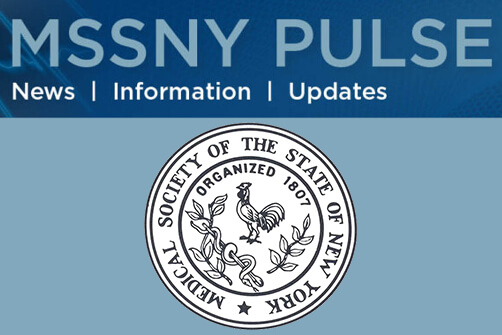
State Budget Takes Steps to Protect Patient Access to Community-Based Physician Care
The final State Budget that passed over the weekend contains the following notable positive outcomes for physicians and the patients they treat:
- Continues for an additional 2 years the law supported by MSSNY that requires health insurers to pay for telehealth delivered services at a level equal to comparable in-person delivered services.
- Does not include an Executive Budget proposal strongly opposed by MSSNY that would have removed authorization and funding for MSSNY’s Committee for Physicians Health.
- Does not include an Executive Budget proposal strongly opposed by MSSNY that would have imposed a 50% cost share on the 16,000 physicians who receive Excess Medical Malpractice Insurance coverage.
- Does not include an Executive Budget proposal strongly opposed by MSSNY that would have prohibited physicians from appealing underpayments from Medicaid Managed Care plans to Independent Dispute Resolution (IDR).
- Does not include an Executive Budget proposal strongly opposed by MSSNY that would have permitted Physician Assistants to practice without physician supervision or collaboration.
- Does not include an Executive Budget proposal strongly opposed by MSSNY that would have increased prior authorization requirements for prescriptions for patients covered by Medicaid.
- Does not include a proposal in Budget negotiations strongly opposed by MSSNY that would have expanded liability costs by expanding damages awardable in wrongful death actions.
- Ensures “continuous” Medicaid/CHIP insurance coverage for a child under the age of 6.
- Provides another $100,000 to MSSNY to continue physician education programming through the Veterans Mental Health Initiative
- Continues the expanded funding for the Doctors Across New York medical student loan repayment program (which was increased by 75% in 2022-23 Budget)
Physicians should be aware of some of the measures that are part of the final enacted Budget that will have an impact on physician practice, including:
- revisions to Medicaid reimbursement for office-administered medications such that the State will reimburse the physician office the lower of: 1) the actual cost to the practitioner 2) the wholesale acquisition cost as set by CMS 3) the federal upper limit, if any, established by CMS; or 4) the state maximum acquisition cost, if any.
- As part of a medical debt reform package, there are new requirements for all healthcare providers to obtain consents from patients to be billed for healthcare services that is separate from the consent for treatment, as well as more detailed requirement regarding the use of medical credit cards.
We would like to thank all the physicians who answered our call throughout the last several months to make a phone call, send a letter or tweet at their legislators and the Governor on many of these issues. And a special thank you to all physicians who took the time to come to Albany last month for our Advocacy Day. All of these efforts were major contributing factors to the Legislature holding firm to oppose many of the adverse provisions that had been included in the Executive Budget.
Given the thousands of pages of State Budget documents, we will continue to provide additional details on items of importance to physicians.
Share
Health Commerce System – New Enhancements and Security Features The Department of Health is updating its Health Commerce System (HCS) to enhance security and improve user experience. Starting May 9th, 2024, you’ll see improvements to our “Forgot Password” feature and login interface. For further details and assistance, click here.
DEA Announces Move to Reclassify Marijuana from Schedule I to Schedule III Colleagues: On April 30, the DEA announced a move to reclassify Marijuana from Schedule I to Schedule III, alongside Ketamine and some anabolic steroids. This would recognize the use of medical marijuana and make it easier to conduct research, but marijuana would not […]
LaughMD App Pioneers Laughter as Billable, Scalable, Evidence-based Medicine LaughMD is improving the approach to healthcare and wellness in hospitals, dialysis clinics and oncology facilities, bringing laughter right to the bedside of patients and into the daily routines of healthcare staff. With a powerful blend of clinical research and innovative technology, LaughMD offers a unique solution to combat […]
California and Oregon Push Toward Universal Healthcare California and Oregon, in response to the federal healthcare policy gridlock, have taken significant steps toward establishing universal healthcare coverage. These states have enacted laws that mandate creating publicly financed, universal coverage systems. These reforms promise substantial cost savings and improved healthcare access for all residents. However, the […]






